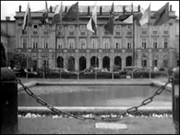 |
| The pact was signed at
the Warsaw Palace |
| 1955: Communist states sign Warsaw
Pact |
England have
The Soviet Union and its Eastern Bloc allies have signed a security
pact in the Polish capital, Warsaw, after a three-day conference.
Announcements in Warsaw and Moscow said the Soviet Prime Minister,
Marshal Nikolai Aleksandrovich Bulganin, and leaders of seven other
countries approved the draft of a new mutual aid agreement called the
Warsaw Treaty of Friendship, Co-operation, and Mutual Assistance.
It is designed, among other things, to ensure close integration of
military, economic and cultural policy between eight Communist nations.
Signatories to the treaty - the USSR, Poland, East Germany,
Czechoslovakia, Hungary, Romania, Bulgaria and Albania - have agreed to
unify their forces under one command although at this stage it is not
known who will take this post.
Fear of West German army
Yugoslavia, the only European Communist state not included in the pact,
was expelled in 1948 from Cominform, the Communist information agency for
refusing to acknowledge Soviet supremacy.
The treaty, signed at the Warsaw Palace, comes in the wake of news that
West Germany has been accepted by western nations into Nato (North
Atlantic Treaty Organisation) following talks earlier this month in Paris.
In a speech at the beginning of the Warsaw talks, Marshal Bulganin
warned that the USA, Britain and France were turning West Germany into
"the principal hotbed of the danger of war in Europe" by allowing it to
re-arm.
He said allowing West Germany into Nato was "the major obstacle" to
reunification of Germany.
Existing bilateral agreements between nations of the Eastern Bloc, he
stated, were no longer sufficient to ensure their security and this Warsaw
Pact would supersede all of
those.
He added that Nato was also encouraging countries in the Near and
Middle East to form military blocs to plan attacks on the Soviet Union and
its allies.
In his concluding speech today, Marshal Bulganin emphasised the pact
was inspired by the Leninist principle of peaceful co-existence between
democratic nations and said they wanted to abide by the United Nations
Charter.
However the Times newspaper editorial today points out that unifying
the armies of all eight countries will also allow the USSR to base its own
troops in member states and "would certainly help to keep the satellites
in order".